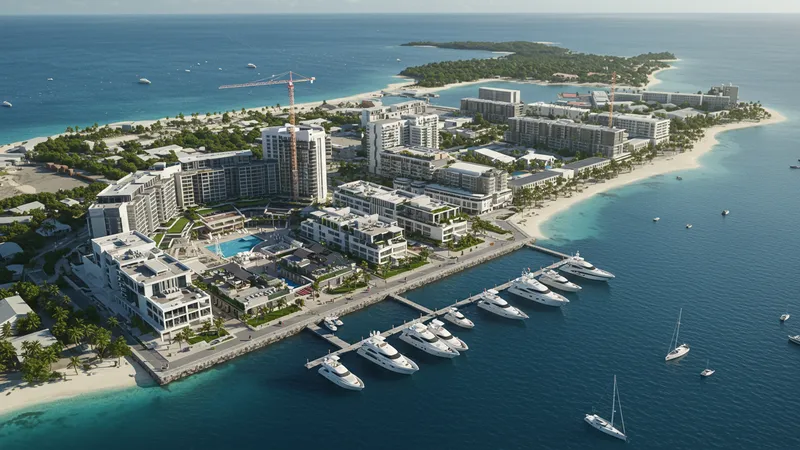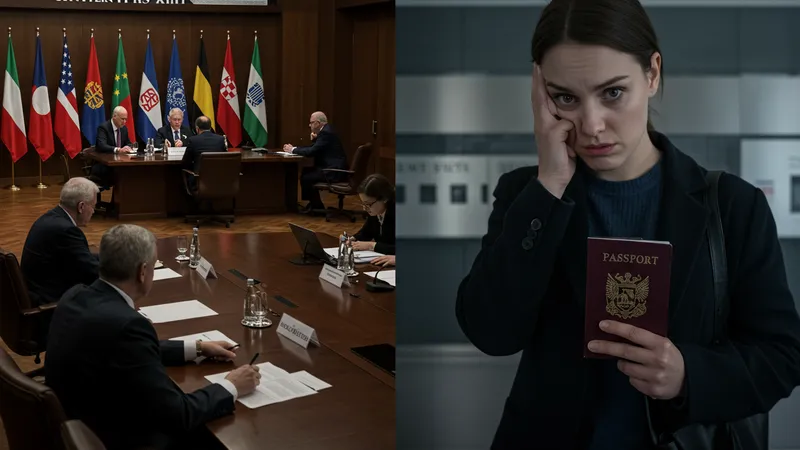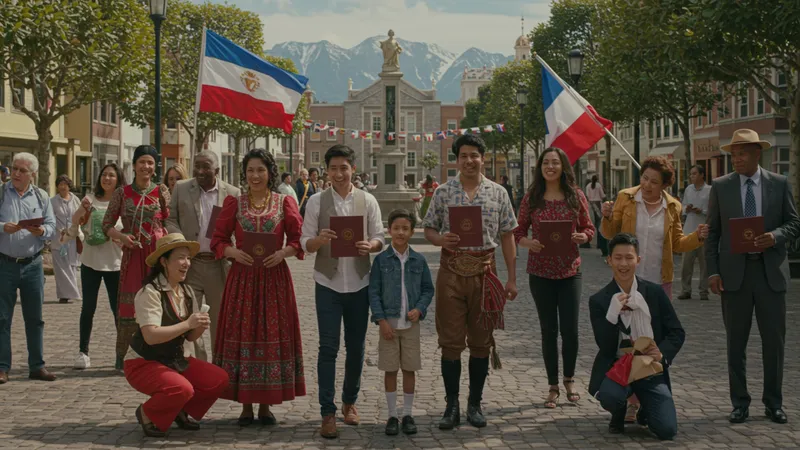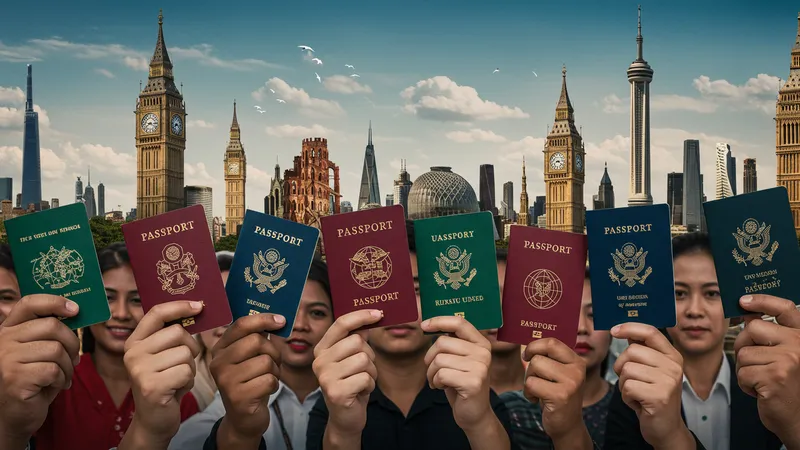Have you ever wondered why the global elite are suddenly obsessing over golden visas and second passports? It’s not just about convenient travel—there’s an urgent reason driving billionaires into bidding wars for dual citizenship.
Right now, these dual nationality programs are more than just a status symbol; they’ve become a safety net amid geopolitical chaos, pandemics, and economic uncertainty. Today, more people than ever are realizing how vital a second home can be.

Here’s a shocking truth: some countries don’t just welcome new citizens—they depend on them. For instance, a remote European nation increased its GDP by 25% thanks to golden visa investments. But that’s not even the wildest part…
Even more surprisingly, for the ultra-wealthy, second citizenship is a crucial aspect of their financial strategy. Some treat it like an investment, choosing countries with stable banking systems, ensuring their assets are insulated from home turmoils. But what truly happens behind closed doors of these lavish citizenship transactions often goes unseen. What happens next shocked even the experts…
Did you know that some countries earn more from selling citizenship than from traditional exports like agriculture or textiles? The citizenship market has become an obscure sector where functions of a typical economy apply, minus most regulations. It is fascinating that some tiny island nations, barely noticed on the world map, thrive because of their economically-driven citizenship sales.

One of the most unexpected aspects is how this demand is fast-tracking entire infrastructure projects in these countries. From luxury residential complexes to technological hubs, the inflow of funds from new citizens is revolutionizing regions overnight. But there’s one more twist—many of these structures are planned solely to cater to wealthy foreign investors, rather than the local populace.
Insider whispers reveal a strange advantage to these lucrative schemes. Not only are investors securing assets, but they’re also strategically set to benefit from future policy changes. Having a foot in multiple political landscapes provides them the resilience often unseen from an outward perspective.
The implications are far-reaching, challenging the very nature of economy and citizenship itself. And if you thought that couldn’t get any more interesting, wait until you learn about the private clubs offering exclusive access to this jet-set strategy. What you read next might change how you see this forever.
Behind the scenes of the citizenship exchange market lies a web of influential clubs that act as gatekeepers. These exclusive networks hold the keys to premium visa programs, offering memberships that allow the scrutinization of potential benefits and risks hidden in investment schemes.

These clubs—not open to the public—use reputation and wealth as the criteria for membership. Access to these circles often means first dibs on limited visa slots and guidance from veteran investors who’ve navigated the turbulent waters of nationality arbitration.
What’s less obvious, however, is how these networks lobby governments for citizenship policies that favor their clientele. Insights from deeply placed sources suggest that behind every passport sold, there are layers of negotiations and strategic maneuvers that seldom see the light of day.
For those not in the inner circle, the barrier to entry remains high. But while the external world sees these clubs as selective sanctuaries for the rich, there’s an unspoken race against time happening within their ranks. As you explore deeper, you’ll discover how impending global shifts could dismantle these exclusivity barriers. But there’s a revelation you won’t anticipate…
Amidst rising nationalism, some countries are rewriting citizenship policies in ways that could alter the second-passport landscape forever. Developed nations are increasingly wary of functioning as second-home havens, and are tightening rules to prevent misuse.

This policy reform has instigated a wave of anxiety among would-be dual citizens. Imagine the possibility of your adopted country being unable to assure your residency due to changing laws. Yes, many fear being caught in a legal limbo, signifying a newfound risk associated with golden visas.
A new trend is emerging, however, with investors eyeing countries previously overlooked. Regions with traditionally conservative policies are now seen as budding opportunities, which may soon change the market dynamic significantly.
Experts warn this trend is a ticking time bomb—move too hesitantly, and you might miss groundbreaking opportunities. But those who adapt quickly enough could redefine global citizenship as we know it. What’s revealed next brings this balancing act to the forefront…
There’s a deep-rooted belief among high-net-worth individuals that holding second citizenship equates to financial nirvana—especially when it comes with lighter tax burdens. Countries once considered unlikely choices for second bases have revamped their tax policies, luring in new residents.

From income tax breaks to no inheritance tax, these nations present inviting prospects. However, local uproar is building against these advantages, arguing they've turned these countries into billionaire playgrounds at the expense of native socioeconomic progress.
The true conflict, however, arises within the global stage as countries wrestle with transparency and fairness. Efforts to align tax policies often clash with national interests, leading to diplomatic strains and renegotiations.
For now, these dilemmas persist without clear resolution, and unforeseen geopolitical movements could tip the scales. With all these dynamics in play, the high-stakes competition for promising citizenship shows no signs of slowing. What happens next in this monumental shuffle will catch many off-guard…
While most discussions focus on financial and travel benefits, there’s an understated advantage second citizenship grants: access to diverse education systems. Families seeking quality schooling often use citizenship as a gateway to renowned universities otherwise closed to outsiders.

Another underappreciated angle involves healthcare. Beyond just the illusion of free movement, a properly chosen second passport might provide access to advanced medical care, ensuring a buffer against healthcare crises.
Beyond safeguarding physical and educational futures, dual citizenship opens paths for unexpected cultural immersion. Engaging beyond borders, families build international networks and social resilience in an interconnected world.
These less-tangential benefits make the citizenship topic even more multifaceted, prompting many to view these programs more holistically. A sudden revelation approaches, promising to redefine what a passport symbolizes…
With heightened climate change awareness, an unforeseen theme is emerging: eco-citizenship. Nations are now integrating environmental commitments into their citizenship requirements, a novel approach resonating well with green-minded investors.

Unexpectedly, such eco-pledges dovetail into sustainable development ventures, harmonizing international environmental goals with local economic growth. Citizenship, thus, transforms into more than a transactional relationship—it’s a mutual contract benefiting both parties.
While skeptics argue this eco-emphasis may be a mere trend, data reflects otherwise. Inhibitors are acknowledging these shared aspirations by incorporating carbon footprint considerations within the decision-making process.
This green pivot could reveal unforeseen ramifications on how citizenship benefits evolve. As this narrative unfolds, the scope of citizenship continues to expand in unfathomable directions. But there’s one more angle to uncover…
The long shadows of citizenship programs reach far deeper than casual observers realize, especially in shaping political frameworks. Industry leaders, profiting from these programs, are stepping into influential advisory roles.

Quietly but steadily, they’re guiding reforms, advocating for balanced national policies that could recalibrate the citizen-investor relationship. The possible convergence of interests invites both optimism and scrutiny.
For policymakers, aligning seamless strategies with evolving sector trends requires nimbleness. We witness a transformative phase where previously underserved communities might gain museums, parks, and infrastructure improvements via newfound revenue streams.
The stakes riding on the influence networks are monumental, warranting involvement from global watchdogs to ensure transparency. What unfolds next in these high-stake diplomatic exchanges might turn predictable norms on their head. One revelation remains…
Pulled by economic turmoil, more people are seeking alternate lives abroad, turning a procedural affair into a deeply personal journey. New citizens often recount not transactions but transformative experiences.

Heartfelt stories abound, showing how dual citizenship is not just an escape but a rebirth for families grasping at new beginnings. It’s not uncommon for once-struggling communities to become melting pots of global cultures.
In combining heritage and opportunity, narratives of personal achievement and interconnectivity emerge, fostering understanding across cultural divides. It’s clear that citizenship is no longer solely an individualistic trophy but a collective bridging mechanism.
As borders blur and connections deepen, citizenship becomes an evolving tapestry symbolizing broader humanity. This evolution challenges us to ponder what being ‘a citizen’ truly means in this rapidly shifting global climate. And this understanding is the game-changer…
Peering into the uncertain future, changes whispered between diplomats today could shape citizenship concepts for decades. Possibilities encompass digital citizenship, blockchain passports, and earth citizenship models proposing boundless nationality.

Progressive attitudes envision a world where traditional constructs fold before innovation, making inclusivity the new norm. Yet, apprehensions abound about losing identity specifics admired by millions.
While currently conjectural, these ideas cook within policymaker labs, nudging us closer to reality. Some geopolitical decisions might accelerate these trends or slow them—but change beckons unmistakably.
What started as a transactional act has transformed into a foundational pillar for global harmony and security, reshaping international bonds. With each step forward, citizenship is redefined, showcasing shared dreams over practiced divisions. Here lies opportunity—grasp it before it shifts once again…
The unprecedented rise in demand for second citizenship is more than an emblematic deluge—it’s an emblem of humanity’s quest toward unity. The passport revolution signifies interconnected aspirations of forging prosperous futures.

National pride remains, yet a unifying thread binds diverse societies together. Cross-border relations, governed less by politics, prioritize shared prosperity and collective survival.
Ironically, as barriers crumble, protecting cultural sanctity becomes paramount. Citizens—new and old—must navigate coexistence cautiously, balancing regional uniqueness with inclusive ambitions.
As walls fall and alliances grow, the citizenship narrative progresses—from exclusive opportunities to inclusive networks. The prospect of contributing to this revolution beckons, bridging solidarities where isolated empires once stood. The final page adorned in revelation awaits…
In navigating the complex dance of global citizenship, one essential truth emerges: as limitations fade, potential blossoms. The shimmering appeal of second passports has morphed into the crucible of global collaboration, breaking traditional molds for new ones.
Stakeholders—be they governments, investors, or individual citizens—must adapt to wield duality advantages correctly, sustainably nurturing evolving societies. The ultimate question becomes, do you dive into this transformative phenomenon or watch as history writes itself?
The power of choice and its profound impacts reside within reach—share this knowledge, spark dialogue, and engage with the narratives shaping tomorrow. Acting together, fresh horizons await, promising empowerment previously unimaginable.